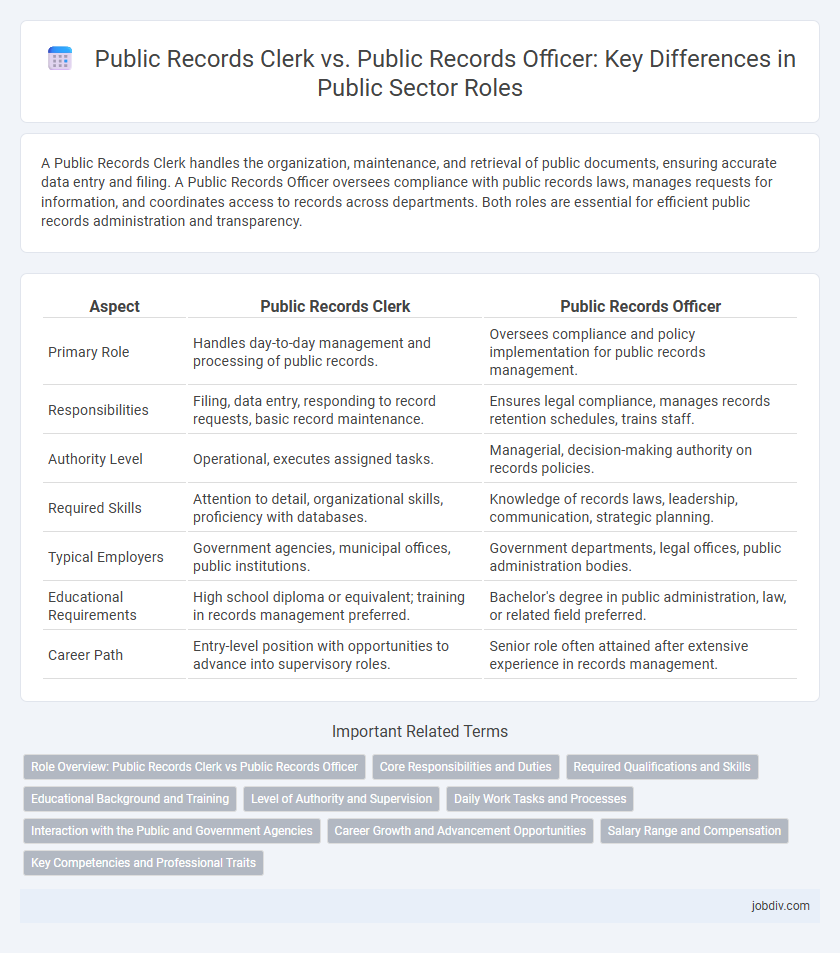A Public Records Clerk handles the organization, maintenance, and retrieval of public documents, ensuring accurate data entry and filing. A Public Records Officer oversees compliance with public records laws, manages requests for information, and coordinates access to records across departments. Both roles are essential for efficient public records administration and transparency.
Table of Comparison
| Aspect | Public Records Clerk | Public Records Officer |
|---|---|---|
| Primary Role | Handles day-to-day management and processing of public records. | Oversees compliance and policy implementation for public records management. |
| Responsibilities | Filing, data entry, responding to record requests, basic record maintenance. | Ensures legal compliance, manages records retention schedules, trains staff. |
| Authority Level | Operational, executes assigned tasks. | Managerial, decision-making authority on records policies. |
| Required Skills | Attention to detail, organizational skills, proficiency with databases. | Knowledge of records laws, leadership, communication, strategic planning. |
| Typical Employers | Government agencies, municipal offices, public institutions. | Government departments, legal offices, public administration bodies. |
| Educational Requirements | High school diploma or equivalent; training in records management preferred. | Bachelor's degree in public administration, law, or related field preferred. |
| Career Path | Entry-level position with opportunities to advance into supervisory roles. | Senior role often attained after extensive experience in records management. |
Role Overview: Public Records Clerk vs Public Records Officer
A Public Records Clerk primarily handles the organization, filing, and retrieval of public documents, ensuring accurate record-keeping and compliance with established guidelines. In contrast, a Public Records Officer oversees the management and dissemination of public records, coordinating with multiple departments to enforce legal standards and facilitate public access. Both roles require thorough knowledge of public records laws, but the officer typically assumes greater responsibility for policy implementation and regulatory compliance.
Core Responsibilities and Duties
Public Records Clerks primarily manage the organization, retrieval, and maintenance of public documents, ensuring accurate data entry and timely access to records. In contrast, Public Records Officers oversee compliance with public records laws, handle complex requests, and implement policies for transparency and record-keeping standards. Both roles require attention to detail, but the officer position involves greater responsibility in legal adherence and public communication.
Required Qualifications and Skills
Public Records Clerks typically require a high school diploma or equivalent, with strong organizational skills, attention to detail, and basic computer proficiency for managing and maintaining public files. Public Records Officers often need a bachelor's degree in public administration or a related field, along with advanced knowledge of legal regulations, records management systems, and excellent communication abilities to oversee compliance and coordinate records access. Both roles demand knowledge of public records laws, confidentiality practices, and the ability to handle sensitive information accurately.
Educational Background and Training
Public Records Clerks typically hold a high school diploma or associate degree in records management, public administration, or a related field, with on-the-job training emphasizing data entry, file organization, and document retrieval. Public Records Officers often possess a bachelor's degree in public administration, law, or information management, complemented by specialized training in legal compliance, records classification, and information governance. Both roles require knowledge of state and federal records laws, but officers generally receive advanced certifications such as Certified Records Manager (CRM) to ensure regulatory adherence and oversee records retention policies.
Level of Authority and Supervision
A Public Records Officer holds a higher level of authority compared to a Public Records Clerk, often responsible for overseeing the management, compliance, and release of public records within an organization. Public Records Clerks perform more routine, administrative tasks such as data entry, file organization, and responding to basic information requests under the supervision of the Public Records Officer. The Officer typically supervises Clerks and ensures adherence to legal standards, recordkeeping policies, and transparency regulations.
Daily Work Tasks and Processes
Public Records Clerks manage the organization, maintenance, and processing of documents, ensuring accurate filing and retrieval within government agencies. Public Records Officers oversee compliance with public records laws, develop policies for records management, and handle complex requests for information disclosures. Clerks typically perform routine data entry and indexing tasks, while Officers coordinate audits, training programs, and responses to legal inquiries regarding public records.
Interaction with the Public and Government Agencies
Public Records Clerks primarily handle routine requests from individuals and government entities, ensuring accurate retrieval and filing of documents while maintaining confidentiality. Public Records Officers oversee complex inquiries, coordinate inter-agency information sharing, and ensure compliance with legal standards in the dissemination of public information. Both roles require strong communication skills, but Officers engage more frequently with higher-level government officials and manage sensitive records requests.
Career Growth and Advancement Opportunities
Public Records Clerks typically start with entry-level tasks such as organizing and maintaining records, offering a foundation for skill development in data management and public administration. Progression to a Public Records Officer role involves increased responsibilities including overseeing records compliance, policy implementation, and staff supervision, indicating substantial career growth and leadership opportunities. Advancing within this field enhances expertise in government documentation systems, regulatory frameworks, and management, making professionals valuable candidates for higher administrative or records management positions.
Salary Range and Compensation
Public Records Clerks typically earn between $30,000 and $45,000 annually, reflecting entry-level responsibilities in managing and maintaining public documents. Public Records Officers command higher salaries, generally ranging from $50,000 to $75,000 per year, due to their advanced roles in overseeing record policies and compliance. Compensation for both positions may include benefits such as health insurance, retirement plans, and paid leave, aligning with public sector standards.
Key Competencies and Professional Traits
Public Records Clerks excel in data management, attention to detail, and proficiency in cataloging and retrieval systems, ensuring accurate maintenance of public documents. Public Records Officers demonstrate advanced organizational skills, regulatory knowledge, and leadership in overseeing compliance with public transparency laws and records access policies. Both roles require strong communication abilities, integrity, and thorough understanding of information governance principles to support effective public records management.
Public Records Clerk vs Public Records Officer Infographic

 jobdiv.com
jobdiv.com